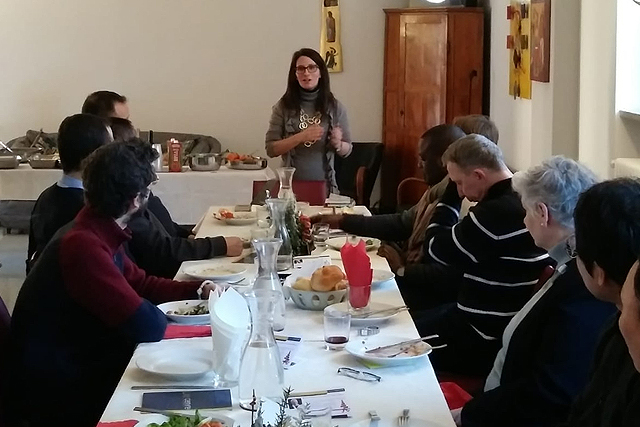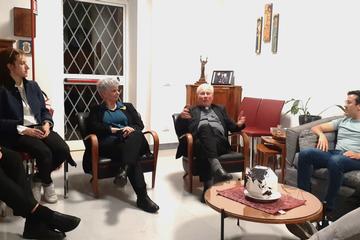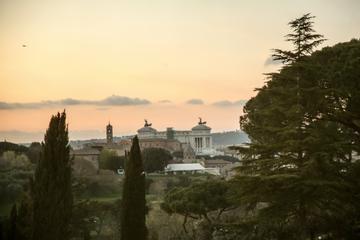
By Elena Dini
ROME — Students of the Pontifical Gregorian University, enrolled in the course, “Friendship in Christian Life,” taught by Lay Centre director Donna Orsuto, came to The Lay Centre for an informal session Jan. 11 to learn more about interreligious friendship.
Mustafa Cenap Aydin, a Lay Centre alumnus and native of Turkey, shared with about 20 students some of his experiences on his path of interreligious dialogue over the past decades. A Muslim, Aydin lived at The Lay Centre more than 10 years ago and has since kept in touch and visited frequently.
He talked about his longstanding relationship with a Catholic priest, Father Jeusset, who would say, “We can call it dialogue but when we meet each other, God’s will is at work for this encounter to happen: it is a moment created and blessed by God.”
“Humanists see the common humanity in the other person in front of them, but I think we can enrich the way we look at the other human being by integrating our faith,” said Aydin.
Aydin, who studied theology, canon law and Catholic Social Teaching for many years at different pontifical universities in Rome, also spoke about his experience of joining Catholic friends during times of prayer, above all in monastic contexts.
“For Muslims, Psalms are part of the revelation and this is confirmed by the Quran,” he said. “A priest once told me he was convinced about my honest will of dialoguing because he realized that when I was joining them for the prayer, I was reading the Psalm, but then I would stop for the Trinitarian ‘Glory Be’ because that was not part of my tradition. I was not pretending to be who I was not.”
Two resident scholars at The Lay Centre joined the discussion: Ravi Nandan Singh and Shishu Kumar Tiwari. Originally from India, they are both in Rome as Nostra Aetate Fellows to learn more about Catholicism. They talked about the importance of personal encounters and how interreligious friendships can be a motor for change, all the while being very fragile because of many challenges. One should, therefore, put extra care to nurture and protect them, they said.
Singh spoke about the sociological research he conducted, in particular, his ethnographic study on cremation.
“I conducted field research in India and I used to meet some nuns from the Little Sisters of Jesus and ask them about ‘how they would like to go’ during discussions on funerary wishes. On one occasion, an aged sister said, pointing to the open cremation at the ghat, that she would like to be cremated as a tribute to Hindus among whom she had lived all her life,” he said.
End-of-life issues are sensitive topics and they are a testbed for friendship, he underlined.
“When a Muslim has a Hindu friend and he happens to die, the question of whether or not to attend his funeral (where he will be cremated) becomes important as a believer in a tradition not allowing for cremation,” said Singh. Certain friends would be standing there next to the pyre until the cremation is over and this is really moving.”


